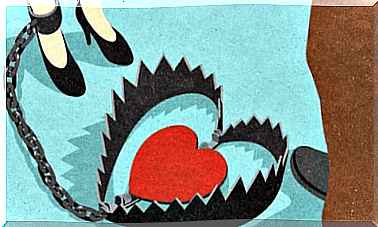Philophobia: The Fear Of Falling In Love

The characteristics of philophobia make it a very specific, unique fear: the fear of forming a strong emotional bond with someone. Some people say this is caused by things like child abuse or divorced parents, but that’s not always the case. There are many cases where there is no apparent reason for this.
How is that possible? What can cause someone to experience a true fear of an emotion that everyone says is so fantastic? It’s a matter of perspective. While some people consider falling in love the most beautiful and intense thing that can happen to you, other people find it terrifying.
There are also those who like to think that this phobia says something about modern society, but the truth is that it seems to have always existed.
For example, some people think that Elizabeth I is a historical figure who probably had a philophobia. They argue that her refusal to marry was a result of what happened to her mother, Anna Boleyn. She was executed by her husband, Henry VIII, because she was accused of having relations with other men.
While it is true that Elizabeth I had several lovers, she herself said that she preferred to keep love out of her life. She was determined that she would never marry.
She couldn’t imagine sharing her life with anyone else. Philophobia ultimately left its mark on her life as a queen, as it does on the everyday lives of the people who have it now.

The Characteristics of Philophobia
Philophobia can take many different forms. No two people experience it in the same way, and there is no pattern that allows for an easy diagnosis. If you look for it in the DSM, all you’ll find is that it’s part of social phobia.
Experts in this field, such as Dr. Scott Dehort of the Delphi Behavioral Health Group in Maryland, say that philophobia is just as common in men as it is in women. There are no biological or genetic factors that determine it, and it can simply develop after a bad experience with a romantic partner.
It’s such a bad experience that it creates a fear that the same thing will happen again, that you will suffer, that you will be hurt again. Over time, the fear turns into a full-fledged phobia.
As we all know, part of the problem with a phobia is that it can lead to other problems such as anxiety disorders, depression, social isolation and drug use.

Romantic Philophobia
When you think of it, the first thing that probably comes to mind is people trying to avoid emotional bonds at all costs. However , some people do manage to take the step and form a bond with someone. The problem here is that the relationship can be extremely toxic.
- These people are often cold, hard, inaccessible and have a constant need for control. They also tend to be jealous and possessive. All of this is a clear sign of the underlying fear and insecurity.
- They also tend to have low self-esteem. They don’t know how to communicate, never give in, don’t empathize. Philophobic people with partners are actually emotional saboteurs. Their insecurity destroys their emotional bond. That fear of commitment and vulnerability leads to unpredictable relationships.
People who avoid all relationships
Then there are those who avoid any kind of relationship at all costs. They don’t just avoid the idea of commitment, partnership or feeling affection, passion and infatuation. These people are really afraid to form an emotional bond, any kind of bond, even friendly.
Think about it. It is a form of social phobia that will almost inevitably lead to isolation, anxiety, panic attacks and several other personality disorders.
This form of philophobia is characterized by physical manifestations of the fear. When someone tries to get closer and bond with that person, someone starts sweating, feels uncomfortable, and the heart rate goes up.

How do you treat it?
Treatment options for people with some of the symptoms listed above can vary widely. Depending on the intensity of the phobia, it may be enough to change their lifestyle.
It may also be that someone can start taking a certain type of therapy, namely exposure therapy. That means they have to face their fear through role-playing with their therapist.
In more severe cases, medication may be required. This is especially true if someone is socially isolated, or suffers from depression or anxiety. In those cases, the person is definitely dealing with a real phobia. This means that cognitive behavioral therapy, for example, can be of great help.
This form of therapy can help identify the fears and change beliefs, thoughts, and negative reactions surrounding the onset of the phobia.
It is important to know that there is a way to treat it. All it takes is involvement. Overcoming this phobia can lead to much better relationships.









